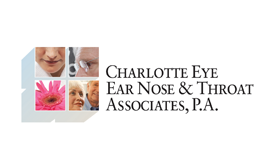By Smarty Guest Blogger Allison R. King, Au.D., Licensed Audiologist, Charlotte Eye Ear Nose & Throat Associates, P.A.
On average one out of every three individuals over the age of 65 has significant hearing loss. The National Counsel on Aging found that individuals with untreated hearing loss report sadness, depression, anxiety, less social activity and insecurity. If you answer ‘Yes’ to any of the following questions, you may be one of the 30 million Americans that have hearing loss.
– Do you or someone you know have difficulty following a conversation at a dinner party or in a restaurant?
– Do you turn up the volume on the television?
– Do you feel that people are mumbling?
– Do you often ask people to repeat themselves?
– Do these problems cause you to feel embarrassed when you meet new people?
So what causes hearing loss? The most common causes of hearing loss are aging, noise exposure, genetics and ear disease. 95% of individuals with hearing loss suffer from sensorineural hearing loss which results from permanent damage to the sensory organ of hearing, the cochlea. It is also referred to as nerve loss or nerve damage. This type of hearing loss generally occurs gradually over time so individuals suffering from the hearing loss don’t often realize how many sounds they are actually missing. Mild to moderate hearing loss affects our ability to hear television and conversational speech clearly. Listening to conversational speech in the presence of background noise becomes especially challenging with even mild hearing loss. Moderate to severe hearing loss impairs our ability to hear on the telephone and our ability to hear conversational speech even in quiet listening environments. Persons with moderate to severe hearing loss often read lips to compensate for what they are not able to hear.
How do we keep our hearing loss from getting worse? Using hearing protection when exposed to loud noise such as gunfire and loud music is a critical step in protecting our hearing. Properly treating ear problems is another way to protect ourselves from further damage. This means seeking medical treatment for wax build up, ear infections, ear drainage or any sudden changes in hearing. Additionally, effective treatment of hearing loss often includes amplification. It is important to be properly fit with the right hearing aid technology when significant hearing loss is present. The sooner a hearing loss is treated, the more successful the patient is with hearing aids. This is because the longer your brain is deprived from certain sounds, the harder it is to learn hearing them again once hearing aids are in place.
Vast changes have occurred in hearing aid technology over the past few years. 100% digital hearing aids have made amplification more appropriate for patient’s listening needs, more cosmetically appealing and more readily available in a number of sizes and technology levels. Hearing aids are smarter, smaller, more individually customized, and have many new features to offer including wireless Bluetooth options. Among the newest and most popular hearing aids are the ‘micro behind the ear hearing aids’ that can be nearly invisible but provide full size hearing aid benefit. These hearing aids also have a more natural sound quality than the previous generation of hearing aids that often plugged the ear canals and caused patients to feel stopped up. By and large, the amplification available today can improve hearing and quality of life with a natural sound through a comfortable and cosmetically appealing hearing device that is easy to operate and customized to each individual user.
If you suspect hearing loss or have never had a baseline hearing test it is recommended that you see a licensed audiologist for a complete hearing evaluation. Your audiologist can determine if you have a treatable medical condition causing the hearing impairment or if the hearing loss would most benefit from the use of hearing aids. He or she can also discuss amplification options with you, including hearing aids and assistive listening devices that help amplify telephones and television. Do not let hearing loss isolate you from your family and friends. Find out what is causing your hearing problem and what steps you need to take to correct it. Better hearing will enhance your quality of life and ease communication with your spouse, co-workers and friends.
**References include the American Academy of Audiology and The National Counsel on the Aging.
![]()

Charlotte Eye Ear Nose & Throat Associates


